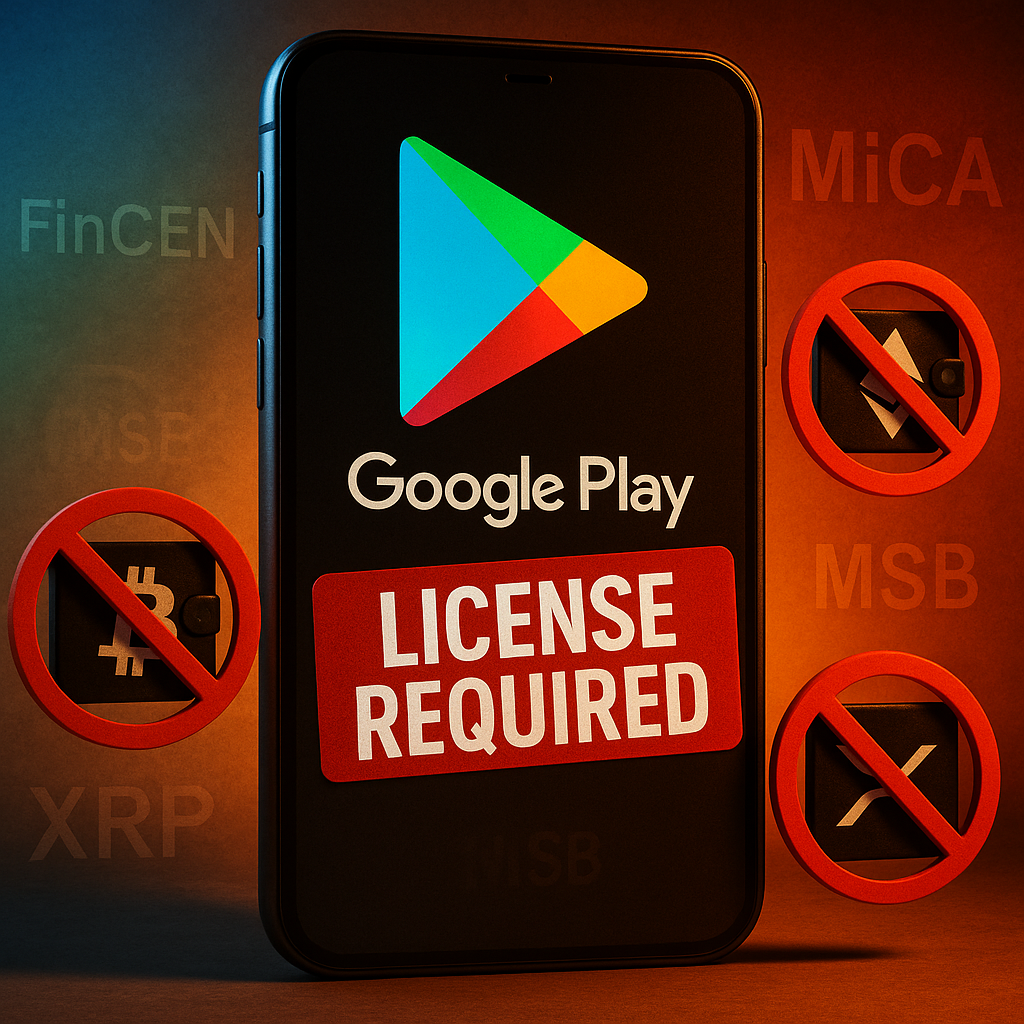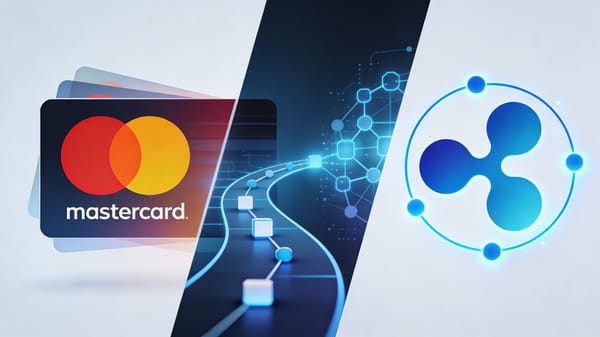Google Play Bans Non-Custodial Crypto Wallets Without Licenses
Google Play Store now requires government licenses for ALL crypto wallets - custodial AND non-custodial. FinCEN/MiCA compliance mandatory across 15 jurisdictions. This changes everything for mobile crypto access.

Google's sweeping new policy effectively removes most self-custody wallets from Android's primary app store, requiring costly MSB and MiCA compliance.
Google Play Store has implemented a major policy shift that will fundamentally reshape how cryptocurrency users access wallet applications on Android devices. The new policy requires all cryptocurrency wallet developers to obtain government licenses such as FinCEN registration in the US or MiCA authorization in the EU before publishing apps on the platform. This change affects 15 jurisdictions and makes no distinction between custodial and non-custodial wallets, potentially driving most independent wallet developers off the world's largest mobile app platform.
The timing couldn't be more significant for the crypto industry. Google's policy applies to both custodial and non-custodial software, placing unmeetable burdens on non-custodial wallet developers who traditionally haven't been subject to the same regulatory requirements as custodial services that actually hold user funds.
Breaking Down the New Requirements
The licensing requirements vary by jurisdiction but create substantial barriers for wallet developers. In the United States, developers must register with FinCEN as a Money Services Business and obtain state money transmitter licenses, or operate as federally or state-chartered banking entities. These requirements come with extensive compliance programs including Anti-Money Laundering (AML), Counter-Terrorist Financing (CTF), and Know Your Customer (KYC) frameworks.
In the European Union, developers must be authorized as crypto-asset service providers (CASP) under the Markets in Crypto-Assets (MiCA) regulation by relevant national competent authorities. However, MiCA licenses are typically designed for exchanges and custodial platforms, not simple software wallets that don't hold user assets.
The policy extends beyond the US and EU to include major crypto markets like the UK, Canada, Japan, South Korea, and others, each with their own specific licensing requirements.
Regulatory Contradiction and Industry Pushback
Legal experts are highlighting significant contradictions between Google's policy and existing regulatory guidance. FinCEN's 2019 guidance on Convertible Virtual Currencies makes clear distinctions between "hosted" (custodial) and "unhosted" (non-custodial) wallets, which it does not classify as money transmitters. This means Google's requirements exceed what federal regulators actually mandate for non-custodial wallet software.
Consensys lawyer Bill Hughes criticized the policy inconsistencies, noting that registering as an MSB is "something FinCEN has specifically and clearly not required" for non-custodial wallets. Hughes warned that "the final boss for crypto is now more likely to be the Big Tech platforms that still dictate the major crypto app distribution channels."
Justin Slaughter, vice president of regulatory affairs at Paradigm, called the move particularly problematic given Google's ongoing antitrust litigation, describing it as "draconian restrictions on persons making non-custodial wallets available on the App Store".
Market Impact and Developer Exodus
The compliance costs associated with MSB registration and MiCA licensing could prove prohibitive for many developers. The compliance programs required of MSBs by FinCEN would drive the majority of non-custodial wallets out of the Play Store, stifle free software innovation to a crippling degree, and force AML/KYC on all non-custodial wallets.
This policy shift represents what critics are calling "regulation by commercial enforcement" - where private platform policies effectively create regulatory requirements that don't exist in law. Google's move transforms private platform policies into de facto regulatory enforcement tools, reshaping crypto access not through law, but through commercial control of app distribution.
The impact could be particularly severe for open-source projects and smaller developers who lack the resources to navigate complex licensing requirements across multiple jurisdictions.
XRP and Ripple: Specific Implications
The Google Play policy changes present unique challenges and opportunities for XRP wallet developers and Ripple's ecosystem. Several XRP-focused wallets currently operate on the Google Play Store, including non-custodial options that allow users to maintain full control over their private keys.
XRP Wallet Vulnerability: Most existing XRP wallets on Google Play will need to either obtain expensive licenses or be removed from the platform. This could significantly reduce accessibility for Android users seeking to store and transact XRP, particularly impacting adoption in emerging markets where mobile-first access is crucial.
Ripple's Strategic Position: Ripple's established relationships with financial institutions and existing compliance infrastructure may position the company to potentially develop licensed wallet solutions. Ripple already operates institutional-grade custody solutions and maintains extensive regulatory compliance across multiple jurisdictions. This regulatory clarity around XRP's non-security status in the US could be advantageous in navigating new licensing requirements.
Partnership Implications: The policy could accelerate partnerships between independent XRP wallet developers and licensed financial institutions, similar to how Ripple has approached institutional adoption. Smaller wallet providers might need to operate under the umbrella of licensed entities to maintain Play Store access.
Price and Adoption Considerations: Reduced wallet accessibility on Android could temporarily impact XRP adoption rates, though this might be offset by increased institutional confidence in more regulated wallet offerings. The long-term impact will depend on how quickly alternative distribution methods emerge and whether Apple implements similar policies.
Ripple's Banking License Advantage: Ripple's July 2025 application for a US national banking license with the Office of the Comptroller of the Currency positions the company uniquely to navigate Google's new requirements. If approved, Ripple would automatically satisfy Google's most stringent compliance standards, potentially allowing development of compliant XRP wallet solutions for the Play Store while most competitors are forced to exit.
Broader Crypto Ecosystem Consequences
This policy shift extends beyond individual wallets to influence the entire cryptocurrency ecosystem. The move comes amid growing mainstream adoption of digital assets, with Bitcoin hitting a record high of $123,000 in August 2025. Google's timing suggests an attempt to impose order on the rapidly evolving crypto landscape through platform control rather than legislative action.
The policy could push users toward several alternatives: web-based wallet interfaces, sideloading applications outside official app stores, or relying more heavily on custodial services that already meet licensing requirements. Some developers may pivot to alternative distribution methods, such as web-based wallets or sideloading, to maintain accessibility for users.
Industry observers note this could set a precedent for other major technology platforms. If Apple implements similar restrictions on iOS, the combined effect would severely limit how most smartphone users access cryptocurrency wallets, fundamentally altering the mobile crypto experience.
Could Ripple's Banking License Add Value to XRP?
Ripple obtaining a bank license could significantly add value to XRP in this Google Play scenario, creating both immediate strategic advantages and long-term competitive positioning benefits.
Direct Compliance Solution: Ripple has already applied for a US national banking license with the Office of the Comptroller of the Currency (OCC) in July 2025, along with a Federal Reserve master account through its subsidiary Standard Custody & Trust Company. Google's policy requires US developers to be "either (a) registered with FinCEN as a money services business and with a state as a money transmitter or (b) a federal or state-chartered bank entity." A banking license would automatically satisfy Google's most stringent requirements, allowing Ripple to potentially develop compliant XRP wallet solutions for the Play Store.
Regulatory Moat and Market Consolidation: If approved, Ripple would become the first federally licensed crypto company, eliminating regulatory overhang and allowing banks and funds to use Ripple's cross-border payment platform (RippleNet) without fearing legal risks. As smaller developers exit due to compliance costs, Ripple's banking license creates a clear path to market dominance in licensed wallet offerings. Android users seeking XRP wallet access would likely gravitate toward Ripple-affiliated or licensed solutions, potentially increasing RLUSD adoption and XRP utility.
Valuation Impact Potential: Multiple valuation models suggest significant upside potential if banking status accelerates institutional adoption. If Ripple captures only one-tenth of SWIFT's yearly $150 trillion messaging volume by routing payments through XRP, each XRP token could be worth approximately $10.91 using a utility-only baseline. The enhanced trust premium from dual regulatory oversight could push valuations to $13.65 or higher, while network-value models suggest that once banks join Ripple Payments at scale, daily XRP settlement volumes of $30 billion could support each coin reaching approximately $16.36.
Important Limitations: However, the banking license doesn't change XRP's legal limits—Ripple remains barred from institutional XRP sales in the US. The license boosts Ripple's compliance capabilities but doesn't immediately alter XRP's direct utility or regulatory classification. Benefits would primarily come through improved integration between Ripple's services and broader infrastructure, with XRP potentially benefiting as a liquidity bridge in new business flows.
The real value lies in positioning: in a world where Google Play bans unlicensed wallets, being one of the few companies with full banking compliance creates asymmetric opportunity. While the license wouldn't directly drive XRP prices, it could establish the regulatory foundation for the institutional adoption that drives long-term value appreciation.
Looking Ahead: Regulation Through Platform Control
Google's policy represents a new frontier in cryptocurrency regulation - one where private companies effectively set compliance standards that exceed government requirements. This precedent could extend to other privacy-focused or crypto-related applications in the future, depending on how developers, users, and regulators respond to this convergence of platform control and fintech regulation.
The crypto community now faces a critical juncture. While some argue that increased regulation brings legitimacy and consumer protection, others contend that platform-imposed restrictions undermine the decentralized ethos that originally defined cryptocurrency. The ultimate impact will depend on how successfully alternative distribution methods emerge and whether regulatory bodies step in to clarify the boundaries between platform policies and legal requirements.
For now, crypto users should prepare for a potentially fragmented wallet landscape where accessing self-custody solutions becomes more complex, while developers race to either obtain licenses or build alternative distribution strategies that preserve user access to non-custodial wallet technology.
DISCLAIMER: This newsletter is for informational purposes only and does not constitute investment advice or a recommendation to buy, sell, or hold any securities. Investments in cryptocurrencies or other financial assets carry significant risks, including the potential for total loss, extreme volatility, and regulatory uncertainty. Past performance is not indicative of future results. Always consult a qualified financial professional and conduct thorough research before making any investment decisions.
Sources
- The Rage - "Google Play Store Bans Wallets That Don't Have Banking License" - https://www.therage.co/google-play-store-ban-wallets/
- Crypto Briefing - "Google Play Store to block crypto wallets without banking licenses in US and EU" - https://cryptobriefing.com/google-play-ban-non-custodial-wallets-licenses/
- CryptoSlate - "Google Play Store bans crypto wallets in 15 jurisdictions, requires new licensing compliance" - https://cryptoslate.com/google-play-store-bans-crypto-wallets-in-15-jurisdictions-requires-new-licensing-compliance/
- Google Play Console Help - "Understanding Google Play's cryptocurrency exchanges and software wallets policy" - https://support.google.com/googleplay/android-developer/answer/16329703?hl=en-GB
- Forbes - "Google Play Store Requires Government Licenses for Crypto Wallet Apps" - https://www.forbes.com/sites/boazsobrado/2025/08/13/google-play-store-requires-government-licenses-for-crypto-wallet-apps/
- Ripple Official Website - "XRP Digital Asset for Global Crypto Utility" - https://ripple.com/xrp/



